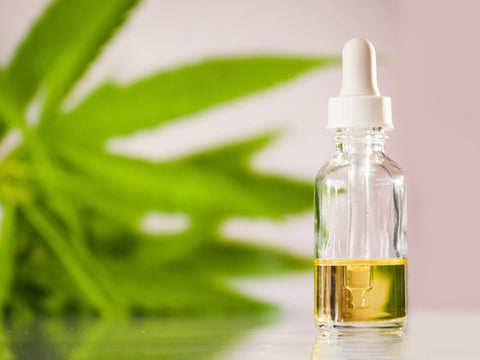Can CBG Help With IBS?
Can CBG Help With IBS?
*Despite what you might read elsewhere on the internet, CBG has not been medically proven to prevent, treat, or cure irritable bowel syndrome (IBS). This article discusses ongoing research into the endocannabinoid system and should not be the foundation of any medical or health recommendations or diagnosis. If you have or suspect you may have IBS, talk to your doctor.*
Irritable bowel syndrome (IBS) is an intestinal disorder. The causes of IBS are not well understood. It can cause symptoms like belly pain, gas, bloating, and cramping. There are two different types of IBS.
- IBS with diarrhea is a condition that triggers loose stool, an urgent need to move your bowels, and cramps or belly pain.
- IBS with constipation triggers symptoms of constipation alongside an urge to go without the ability.
- IBS-mixed can have symptoms of both types.
Although physicians are not sure what causes the condition, it can still be treated. IBS affects more than 35 million people living in the U.S. The condition is uncomfortable and sometimes painful but does not lead to cancer. Although the International Foundation for Gastrointestinal Disorders states that IBS is not caused by stress or your diet, it can be worsened by these triggers. They recommend keeping a personal diary to help find triggers that worsen your symptoms.
Irritable bowel syndrome affects more women than men. Worldwide, experts estimate that up to 15% of the population has symptoms of IBS. Most people with IBS are under age 50, but even older adults can experience IBS. The symptoms may range from mild inconvenience to severe debilitation. The symptoms are often unpredictable. This means the condition may trigger social isolation. Experts believe other factors that play a role in the development of symptoms include:
- Early life stress - People who have experienced traumatic or stressful events in childhood have a higher risk of IBS.
- Severe infection - Some people develop IBS after a severe gut infection from bacteria or a virus.
- Muscle contractions in the intestine - Contractions that move your food through the digestive tract can last longer than normal. This can cause gas, bloating, and diarrhea. Weak contractions can slow food passage and lead to constipation.
- Nervous system - Poorly coordinated nerve signals between your gut and your brain can change the digestive process.
- Changes in your gut microbiome - your gut has a balance of beneficial and harmful bacteria. Evidence shows people with IBS have a different microbiome than healthy people.
How CBG Affects the Endocannabinoid System
The Cannabis sativa plant has a long history of human use. Cultivation dates back to the early colonists who grew hemp to make cloth and rope. Both marijuana and hemp are from the Cannabis sativa species. The early plants had very low levels of tetrahydrocannabinol (THC). This is the chemical responsible for the psychoactive properties of marijuana.
As the scientists were studying the chemicals found in cannabis plants, called cannabinoids, they discovered humans have receptors built specifically for cannabinoid-like chemicals. Receptors are areas on the cell structure that bind with chemicals and then activate a cell to take action. Researchers called the network of receptors the endocannabinoid system. “Endo” means it is found in the body.
Scientists have identified two types of receptors in the human endocannabinoid system. These are CB1 and CB2. CB1 receptors are most often found in the central nervous system (brain) but can also be found in the gut and immune system. CB2 receptors are found in the immune system and the gastrointestinal system. A small number are also found in the brain. The endocannabinoid system helps maintain homeostasis (stability) within the body. It modulates several physiological processes, such as sleep, inflammation, pain, and stress.
Cannabigerol (CBG) is one of the cannabinoid chemicals found in the Cannabis sativa plant. Scientists have identified more than 100 cannabinoids that are largely responsible for the effects of cannabis plants. CBG is a non-psychoactive compound and is made from cannabigerolic acid (CBGA). This is the first cannabinoid the plant produces. CBGA is the starting point for many cannabinoid compounds. This earned CBGA the name “the mother of all cannabinoids.”
Most cannabis plants typically have a low percentage of CBG because much of it is converted into CBD, THC, and CBC. Some hemp producers are investigating different ways of boosting levels of CBG in the plant to take greater advantage of the health benefits.
CBG and IBS
To date, the research on CBG is just beginning. Researchers must isolate the compound from the plant before it can be tested independently. Some of the current findings suggest that it influences the endocannabinoid system and other parts of the body as well.
Although CBG does not bind strongly with either endocannabinoid receptors in the body, it does appear to reduce the reuptake of anandamide. This is one of the main endocannabinoids your body makes. By reducing reuptake, it increases the level of anandamide in your body, and therefore increases the effectiveness of your own chemical.
Science has discovered evidence that CBG may have antioxidant properties and may help to reduce intraocular pressure, which is important in those who have glaucoma. The endocannabinoid system plays a significant role in inflammatory bowel diseases such as IBS. CBD is well researched, and scientists find it may help to reduce intestinal inflammation. While CBG research is in the early stages, scientists are hopeful that further analysis will support the use of CBG in people who have symptoms associated with IBS.


